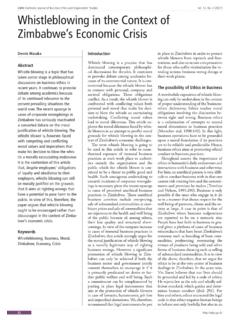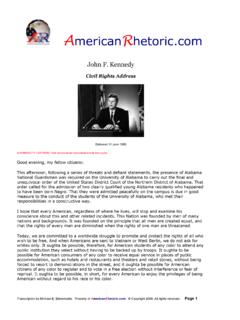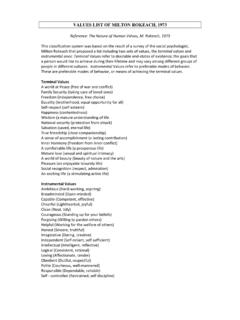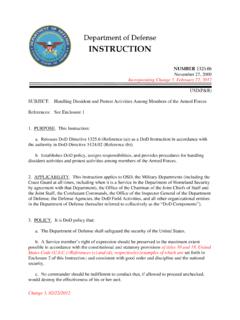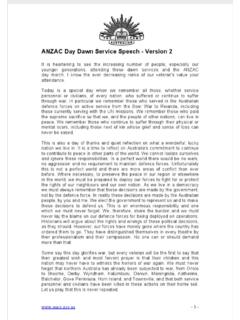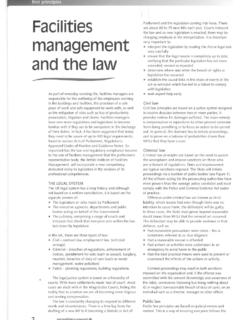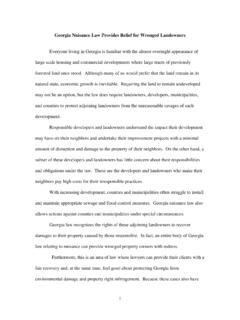Transcription of EJBO Theories on Teaching & Training in Ethics
1 EJBOE lectronic Journal of Business Ethics and Organization StudiesVol. 13, No. 2 (2008)19 on Teaching & Training in Ethics Peter BowdenVanya Smythe Abstract The paper examines the education and Training of adults in Ethics . It applies to courses at universities and colleges as well as in the work place. The paper explores the evi-dence on our ability to strengthen moral behaviour through courses on Ethics , finds it to be weak, so starts with the assumption that we cannot teach people to be ethical. The paper asks therefore what the objectives of a course could be and how best to achieve them. It examines the different Theories in the literature, eventually settling on four objectives: increasing moral cognition; teach-ing a widening and strengthening of ethical practices; adopting Teaching approaches that maximise learning impact, and developing the personal skills of individuals in negotiation and persuasion.
2 All four objectives are of value to people who seek an ethical work environment. The paper then explores the Theories and differing approaches used for achieving each objective, including among others, public interest disclosures, structuring and using codes of Ethics , case prob-lems and other experiential learning techniques, organisational and institu-tional approaches to ensuring ethical behaviour, classroom interaction, the role of theory, team Teaching and tailoring the courses to meet an ethi-cal needs analysis for that discipline, profession or Ethics , organisational development, moral philosophy, whistleblowing, public interest dis-closures, ethical behaviour. IntroductionAt the time of the Enron and World Com collapses, the expectation that ethi-cal behaviour can be taught , and that university and college Ethics teachers had failed was widespread.
3 Evidence of this expectation was also seen within the US military who, following the revelations of torture at Abu Ghraib, instituted Ethics Training for all servicemen in Iraq. Civil sector research (Dean and Beggs, 2000) into the question of whether ethical be-haviour can be taught concludes that most tertiary Ethics teachers do not be-lieve that they can teach ethical behav-iour. In a comprehensive examination of the literature, they document the diff er-ing views on this issue and the overriding belief that no course will change ethical eir conclusions seem axiomatic - that we cannot build stronger ethical be-haviour through exhorting people to be ethical - nor for that matter by coaching them in the multitude of ethical Theories that exist. Sims claims, however (2002), that Teaching Ethics can be eff ective in de-veloping students moral reasoning skills, ethical sensitivity and ethical behaviours.
4 See for example (Weber and Glyptis, 2000). Th at research does show a posi-tive correlation between a course and the ethical values and opinions of students - an issue with which we agree and which is discussed further below. Nevertheless, although a course may bring about a de-sirable increase in intellectual awareness of the rights and wrongs of moral issues, such an increase does not necessarily en-sure that people with strengthened moral reasoning will then act ethically. Inter-views with an Ethics trainer for a number of Fortune 500 companies, and with the President of the Academy of Manage-ment, also affi rm this view (Th ompson, 2006, 2007).Objectives of a course If we cannot teach people to be ethical, then what can we achieve with an Ethics course and what should such a course include?
5 Th e answers vary (see Wines, 2007). In an earlier co-authorship with Brinkmann, Sims (2001) set out seven goals for a business Ethics course:1. Know thyself, your own moral val-ues and Learning to see moral issues, con-fl icts and Learning to identify the specifi c moral aspects of a Learning to share moral Learning how to handle moral issues and confl Acquiring moral Acquiring a critical attitude towards the business school curriculum and its ey do not set strengthening moral behaviour as an , Corey and & Callanan (2005) set nine course goals:1. Ensure students recognise and ap-preciate the unavoidable ambiguity in Ethics , of multiple points of view or contradictory Instil in students the idea that there are multiple pathways to addressing a single ethical Improve students Improve ethical Improve moral Instil determination to act ethically.
6 7. Teach students the profession s es-tablished code of Teach students their legal, ethical and professional Teach questioning of the ethical di-mensions of their their paper they ascribe students determination to act ethically as a re-sult of their courses. But again, this re-sult - which the authors say they achieve - is based on students self-reporting of changes in their values; not on an empiri-cal measure of changed behaviour. Webber (2007) says Ethics courses in industry should build ethical awareness and promote the company s moral values in order to broaden the criteria used by managers when making decisions with moral implications. He advocates stimu-lating managers to become more other-oriented by exercises in which all stake-holders are treated as equal in contrast to their level of infl uence on corporate performance.
7 Other aims that Webber espouses are:1. To engender trust and confi -EJBOE lectronic Journal of Business Ethics and Organization StudiesVol. 13, No. 2 (2008)20 among To stimulate mutual moral development through self-discovery in peer group discussions of real ethical To develop a concrete plan for a career-long, ongoing moral enhancement of individual attitudes and planned busi-ness acknowledges research (Ferrell et al., 2002) that shows how the ethical culture of an organisation has a strong in-fl uence on ethical business judgements. Th erefore Ethics Training should also make employees overtly aware of the ethical culture and values of the organisation and wherever possible leverage the collective pressure of Teaching in groups to aff ect learners and employees ethical decision making (Weber, 2007).
8 We agree with most of these objectives, but believe that some are subsets of broader objectives; others are a natural outcome of an Ethics course. We propose four principal objectives for a course:1. Building ethical sensitivity and moral Providing a widened applied Teaching content that cov-ers all ethical Adopting Teaching methods that maximise learning impact in relation to ethical knowledge and behaviour. 4. Developing negotiating and persuasive capabilities (oral and written skills for use in assessing and advocating an ethical position).Objective 1 is a commonly agreed objective, and one that is readily 2, enrichment of the Teaching content, is our main departure from our interpretation of the content generally evi-denced in the literature. We suggest expanding the content of a course in four broad areas: (a) building-in the ethical issues that are known to the discipline or organisation as a signifi cant part of the course; (b) developing and using codes of Ethics based on those issues; (c) Teaching the management of public interest disclosures to all concerned parties the organisation, the leg-islator and the whistleblower - in suffi cient detail to ensure an eff ective impact ; and (d) providing an organisational structure that can manage each of these functions.
9 Objective 3 provides our interpretation, and Teaching objec-tives, of fi ve issues discussed widely in the literature: (a) skills required of trainers/teachers, (b) optimum class sizes, (c) teach-ing across the curriculum, (d) experiential learning and (e) the role of ethical theory in a course. Objective 4 simply states that we need to build the skills and capabilities of both students and members of the workforce suf-fi cient to eff ectively manage ethical situations that are at ethical sensitivity and moral cognition [Objective 1]Courses in Ethics with case problems and lectures on ethical theory do increase students ability to reason through moral is-sues. Th e following examples of the impact of Ethics courses on ethical sensitivity and cognition are drawn from and Ellison (1998) used Rest s Defi ning Issues Test (DIT) to assess if there was an increase in moral reasoning from students who took an Ethics course.
10 Th e researchers applied the test before and after the course and found a signifi cant increase in reasoning capabilities. Drake et al. (2005), using the DIT on assessing capabilities in moral reasoning, also found a signifi cant increase between the beginning of a course and its end. Th e class size was164 stu-dents, employing 6 Teaching fi ndings are widespread and well accepted - that dis-cussions on moral practices and the Teaching of ethical theory increase capabilities in moral reasoning. Whether this reasoning translates into higher levels of moral practice is a separate concern. Such an assessment is diffi cult to measure, as the Centre for Vocational Assessment and Research concluded after their study into the assessment of attitudes, Ethics and behaviour at work (Mossop, 1997).

